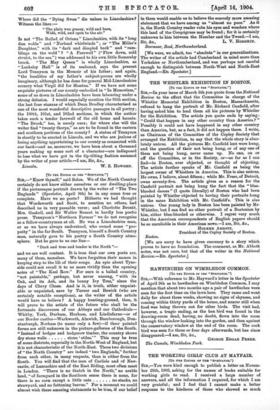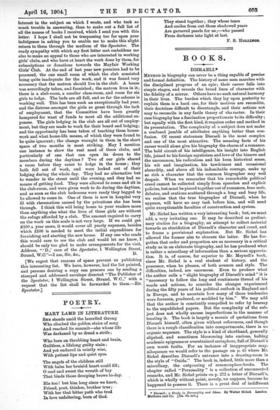Interest in the subject on which I wrote, and who
took so much trouble in answering, than to make out a full list of all the names of books I received, which I send you with this letter. I hope I shall not be trespassing too far upon your indulgence in asking you to enable me to make this slight return to them through the medium of the Spectator. The ready sympathy with which my first letter met emboldens me also to make an appeal to those who are interested in working girls' clubs, and who have at heart, the work done by them, for subscriptions or donations towards the Mayfair Working Girls' Club. At the end of last year new promisee had to be procured, the one small room of which the club consisted being quite inadequate for the work, and it was found very necessary that the matron should live in the club. A house was accordingly taken, and furnished ; the matron lives in it; there is a club.room, a smaller class-room, and room for six girls to lodge. The beds are all full, and so far the scheme is working well. This has been such an exceptionally bad year, and the distress amongst the girls so great through the lack of employment, that the Committee have been greatly hampered for want of funds to meet all the additional ex- penses. The girls lodging in the club are all out of employ- ment, but they are made to work for their board and lodging; and the opportunity has been taken of teaching them house- work and what home-life means, of which they were found to be quite ignorant; the change wrought in them in the short space of two months is most striking. May I mention one instance to show the real need of these clubs, and particularly of one that can open its doors to the members during the daytime ? Two of our girls shared a room before they came to lodge in the house ; they both fell out of work, and were looked out of their lodging during the whole day. They had no alternative but to wander in the street until the evening, and they had no means of getting food. They were allowed to come and sit in the club-room, and were given work to do during the daytime, and as soon as the club bedrooms were ready they begged to be allowed to come in. One of them is now in hospital very ill with rheumatism caused by the privations she has been through. I think this will bring home to your readers more than anything else what the lives of these girls are without the refuge afforded by a club. The amount required to carry on the work on this scale is not very large. If we could get £100 a year more, it would cover all yearly expenses, besides which 2100 is needed to meet the initial expenditure for furnishing and starting the new house. If any one who made this would care to see the club and would let me know, I should be only too glad to make arrangements for the visit, Address, "'D.,' care of the Spectator, 1 Wellington Street,
Strand, W.C."—I am, Sir, &c., D.
[We regret that reasons of apace prevent us publishing this interesting list. We have, however, had the list printed, and persons desiring a copy can procure one by sending a stamped and addressed envelope directed "The Publisher of the Spectator, 1 Wellington Street, Strand, W.C.," with a request that the list shall be forwarded to them.—En. Spectator.] POETR,Y.
MARY LAMB IN LITERATURE. San stands amid the laurelled throng Who climbed the golden stairs of song And reached its summit—she whose life Was darkened by so dread a strife;
Who bore on throbbing heart and brain, Guiltless, a lifelong guilty stain : And yet endured in saintly wise, With patient lips and quiet eyes.
The angels of the children still
BOOKS.
DISRAELI.'
M.ETHOD in biography can never be a thing capable of precise and formal definition. The history of some men marches with the disciplined progress of an epic; their career falls into simple stages, and reveals the broad lines of character with the fidelity of a mirror. Others have no such natural harmony in their lives. The burden which they lay upon posterity to explain them is a hard one, for their motives are recondite, their doctrines difficult to disentangle, and their actions not easy to reconcile in any facile theory of character. In their case biography has a fascination proportionate to its difficulty ; but equally with the first kind, it requires order and method in its presentation. The complexity of a subject does not make a confused jumble of attributes anything better than con- fusion. Of recent statesmen Disraeli is the most complex and one of the most attractive. The amazing facts of his career would alone give his biography the charm of a romance. The bold circuit of his intelligence, his insight into English life, joined to his foreign mysticism and love of the bizarre and the uncommon, his radicalism and his keen historical sense, his wit and imagination, his tawdriness and occasional absurdity, and above all his indomitable courage, make up so rich a character that the common biographer may well despair. When we remember that his remarkable political creed cannot be collected simply from speeches and explicit policies, but must be pieced together out of romances, bons mots, debates, and orations scattered through a long and busy life, we realise that the true biographer of Disraeli, when he appears, will have no easy task before him, and will need quite exceptionable faculties of construction and system.
With balm her bruised heart could fill; 0 cool and sweet the wreath of bay That binds three drooping brows in-day.
His too ! but him long since we knew, Friend, poet, thinker, brother true; - With her that bitter path who trod
In love unfaltering, born of God.
• Dieresli: a Study in Personality and Idsos. By Walter Stahel London Methuen and Co. [12s. rd. ;tell







































 Previous page
Previous page